Shevlin Sebastian's Blog, page 84
September 30, 2016
The Heart Of The Matter
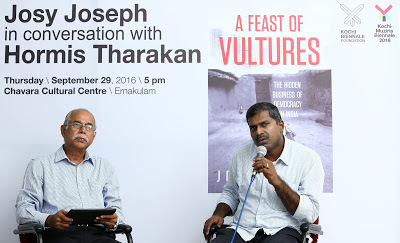 Investigative journalist Josy Joseph has written a best-selling non-fiction book, A Feast of Vultures: The Hidden Business of Democracy in India
Investigative journalist Josy Joseph has written a best-selling non-fiction book, A Feast of Vultures: The Hidden Business of Democracy in IndiaBy Shevlin Sebastian
In the past 25 years, noted investigative journalist Josy Joseph has changed jobs eight times. “That is because many of my stories could not get published,” he says. “So I had to move on.” With a touch of bittersweet wit, he saved the rejected stories in a computer folder called 'Morgue'.
Josy recounted this incident during the Kochi Biennale Foundation’s ‘Let’s Talk’ series held in the city on Thursday. He has just published a non-fiction book called, A Feast of Vultures: The Hidden Business of Democracy in India.
Josy was in conversation with Hormis Tharakan, the former Inspector-General of Police in Kerala. “Josy is in eternal quest of the elusive truth,” says Hormis. “He has a racy style of writing, but it does not diminish the importance of what he is writing.”
The book is heading towards the best-sellers lists, and takes a deep look at the endemic corruption at the core of Indian democracy. “It is about the kind of people who have been running India for the past 60 years,” says Josy. “There are many celebrated business leaders who have exploited the poor. Somehow, as a people, we are unable to distinguish between right and wrong.”
The subjects include a focus on the aviation sector, with its underworld links, the role of middlemen, the shenanigans in the private sector, and a chapter called, 'The Big League'. It took nine years to write, because for every fact that he wrote, he ensured that there are documents to prove its authenticity.
Asked how corruption can end, he says, “The day political funding becomes transparent, corruption will end.”
As Josy moves around the country, he is enthused by the response of the youth towards his book. “They are very excited by it,” he says. “Everybody feels that the status quo cannot go on, because Indians are losing hope in the various institutions of governance. Things have to change.”
Published on September 30, 2016 01:27
September 27, 2016
The Way To A Healthy Lifestyle

 N. Balasubramanian, the CEO of the Hyderabad-based company, talks about the benefits of organic food, while on a recent visit to Kochi
N. Balasubramanian, the CEO of the Hyderabad-based company, talks about the benefits of organic food, while on a recent visit to KochiPhotos: N. Balasubramanian; an atta packet
By Shevlin Sebastian
A few months ago, N. Balasubramanian, the CEO of the Hyderabad-based Sresta Natural Bio Products Ltd, which owns the '24 Mantra Organic' food brand, was travelling in a cab in New Delhi.
He got talking to the driver about organic food. When the driver asked him the name of the brand, Balasubramanian said, “24 Mantra Organic.”
The driver shocked the CEO when he said, “That is what I use. The atta (wheat) is very good. It is Rs 52 a kg, and it costs me Rs 500 a month, but I don't mind. My family enjoys good quality rotis, which I used to eat as a child.”
At the Lulu Mall, on a recent visit, to Kochi, Balasubramanian says, “I have never forgotten that conversation.” Meanwhile, as he is speaking, at the Hyper Market, where the company has a section, Radha Menon (name changed) takes a 5 kg bag of wheat. “I have been using this for two years,” she says. “The quality is very good.” Balasubramanian smiles when he hears this.
The USP of the company is that, with the help of 32,000 farmers, it makes its own food, pesticide-free, in an area of 1.7 lakh acres, across 16 states. “We encourage the farmers to use cow dung and other natural fertilisers,” says Balasubramanian. “In place of pesticides, we encourage them to use neem, ginger and cow urine. Essentially, we are using traditional methods in a scientific manner.”
The company goes to areas where particular crops grow well. So, they grow ginger in Sikkim, gram in Maharashtra, jaggery and sugar in Karnataka and Uttarakhand, chillies (Andhra Pradesh), peanut (Karnataka), apart from black pepper, cardamon and spices in Kerala.
Meanwhile, the company is very particular in the way they store the produce. “We have developed our own indigenous methods,” says Balasubramanian. “At the storehouse, we just remove the oxygen from the atmosphere. As a result, no insect can breathe and spoil the produce. We do this for 15 days, till the larva cycle ends. Thereafter, we put the products in a pack and seal it.”
Following this, it is checked by any one of the 14 international agencies which are accredited with the government of India. Thereafter, it is sold through 250 outlets in departmental stores and malls.
Asked why they don't have their own stores, Balasubramanian says, “We are already doing farming, processing, packaging and marketing. It would be too much to run stores, too.” In Kochi, you can get their products at Sunrise City, Panampally Nagar, SR Organics, Tripunithara, and Bismi Supermarket, Kaloor, among other places.
But Balasubramanian is honest enough to admit that the products are on the expensive side. “For a family of four, you will be buying Rs 4000 worth of food products every month,” he says. “But when you switch to '24 Mantra Organic', it will go up by Rs 1500. But this is just the cost of a movie outing at a multiplex for a family.”
And it may be safer to pay more and have organic food, so that you can avoid dangerous diseases like cancer. “Anybody I meet I ask this question: do you know of anybody who has cancer? And the answer is always yes,” says Balasubramanian. “Cancer from pesticide-laden food happens over several years, and not in a short time of, say, five years.”
Finally, when asked about the meaning of the word, '24 Mantra Organic', Balasubramanian says, “It stands for a Sanskrit slogan: 'Bhumir Apo Analo Anilo Nabha' – 'You alone are the Earth, Water, Fire, Air and Ether'. When you write it in English there are 24 letters.”
(The New Indian Express, Kochi, Thiruvananthapuram and Kozhikode)
Published on September 27, 2016 22:54
September 26, 2016
Go Kayaking, Collect Waste
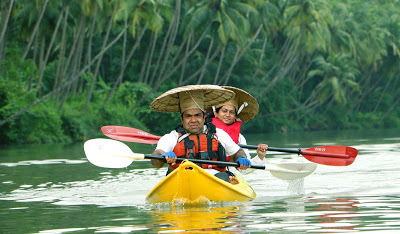
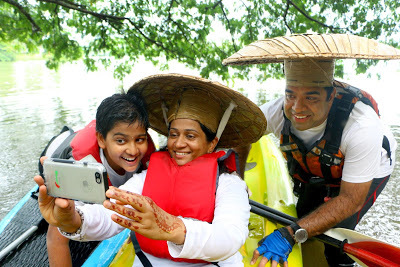 A Kerala couple is trying to create awareness of the garbage in rivers, and the joys of kayaking
A Kerala couple is trying to create awareness of the garbage in rivers, and the joys of kayaking Photos by TP Sooraj
By Shevlin Sebastian On a Friday afternoon, in July, I step into a two-seater kayak, on the Chaliyar river in north Kerala. Sitting behind me is kayaking expert Kaushiq Kodithodi, 44. As we move towards the middle, the rain suddenly begins to fall. Soon, it increases in force.
As the rain hits the river, small eruptions of water take place. It is like so many sparkling diamonds. On the bank, thanks to several trees, there is a glorious screen of green. The thick dust on the leaves during the dry summer months is just a memory now.
“Look at it,” shouts Kaushiq. “Isn’t it beautiful?”
It is, indeed.
We paddle on, exhilarated by the roar of the monsoon.
A few minutes pass. And, then, the first shock comes, in the form of an empty Haywards 5000 beer bottle floating by. “Pick it up,” says Kaushiq. I do so, and place it behind me. Thereafter, there is a woman’s slipper followed by an empty plastic brandy bottle. A bottle cap floats by. Then a large blue packet. As I reach out to pick it up, I recoil because of the stench of food waste. But Kaushiq has no hesitation to pick it up.
“In 10 minutes you can collect one kilo of waste,” he says. “But the Chaliyar is a less dirty river. In rivers, near major cities like Kochi and Thiruvananthapuram, the pollution is alarming. Most of the [44] rivers in the state have become garbage dumps.”
It is this environmental degradation that prompted Kaushiq to start the Jellyfish Project, three years ago, along with his wife, Ruby, 39. “We want to create awareness among the people to avoid throwing waste into the waters,” says Ruby. “We are also focusing on schoolchildren so that, at least, the next generation will be sensitised about the issue.”
One who is already sensitised is their son, Rayn, 11, who goes kayaking often with his parents. Asked whether he would throw garbage into the river, he says, “Never.”
On July 23, the couple held a 'Catch of The Day' programme at Cheruvannur, near Kozhikode. The 'catch' was the garbage, collected by a few boys. The programme was inaugurated by the local MLA VKC Mammed Koya.
Incidentally, the waste that is collected will be recycled. “We are working closely with a waste-management expert, Dr. Reena Anilkumar,” says Kaushiq.
Meanwhile, apart from waste-collection, the couple want to spread the joys of kayaking among children. “It is the easiest and safest way to explore rivers,” says Ruby. “And it is a far better hobby than watching TV or playing video games.”
As for Kaushiq, he got interested in kayaking when he went to Miami, USA, on a business trip in 2006 and saw people kayaking there. “I tried it and enjoyed the experience,” he says. “Thereafter, I bought my first kayak, in 2004, and have been using it ever since.”
Asked about the technicalities of the kayak, he says, “The minimum length is four feet, but it can go up to 20 feet. A good-quality recreational kayak costs Rs 70,000. The most-expensive one we have is an 18-feet Swedish boat by the name of Point 65 North, which costs around Rs 5 lakh.”
Every month, the Dubai-based financial consultant visits Cheruvannur to keep the Jellyfish project moving forward with a team of hired staff.
They organised a two-day Chaliyar River Challenge 2016 on September 23, in collaboration with the District Tourism Promotion Council and Clean Rivers Initiative Trust. More than a hundred people took part in the event that started from Nilambur town and reached Beypore 62 km away. Participants collected waste from the river.
“Apart from this, we organised street plays and musical programmes to create awareness among the people,” Kodithodi says.
He pauses and says, “Through these projects I want to do my bit for the state and the country.”
(Sunday Magazine, The New Indian Express, South India and Delhi)
Published on September 26, 2016 05:58
September 23, 2016
A Touch Of Kerala In Seattle
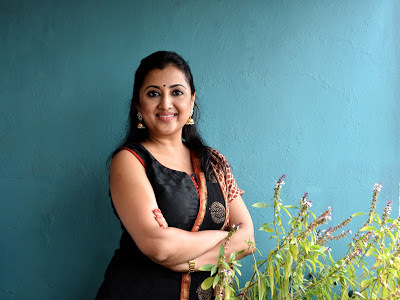
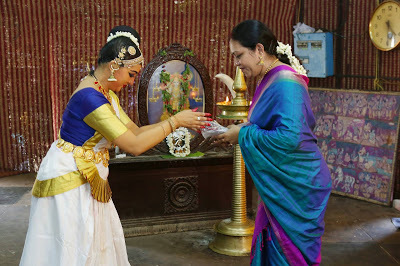
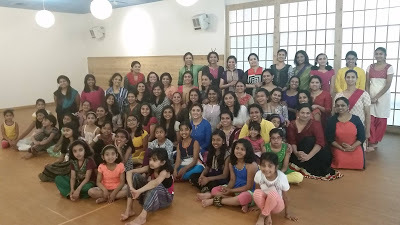 Smitha Krishnan runs the Mohini School of Dance in the USA. She talks about her experiences, while on a recent visit to Kerala
Smitha Krishnan runs the Mohini School of Dance in the USA. She talks about her experiences, while on a recent visit to KeralaPhotos: Smitha Krishnan by Ratheesh Sundaram; Smitha taking blessings from her guru Suchithra Visweswaran; the students at the Mohini School of Dance at Seattle
By Shevlin Sebastian
A few years ago, Mohinyattom stalwart Suchithra Visweswaran fell ill. An ardent devotee of Lord Krishna, she prayed to the Lord that if she recovered completely, she would perform at Guruvayur.
And Krishna listened to her prayers. For the past 11 years ago, Suchithra has been performing there with her students. When the Seattle-based dancer Smitha Krishnan became her disciple three years ago, Suchithra encouraged her to perform at Guruvayur also.
Smitha runs the Mohini School of Dance in the US. Finally, on August 18, a group of six dancers – Vinitha Vijayan, Manju Jyothish, Julie Antony, Soumya Pradeep, Reshmi Sekhar, and Smitha herself – did a performance titled ‘Krishnarchana’ at the Melpathur Auditorium.
“It was a wonderful experience,” says Smitha, while on a recent visit to Kochi. “And it was well received by the audience.”
It was in September, 2013, that Smitha got the idea of starting the school. A lot of her friends started asking her whether she could start teaching dance. “Initially I started it as a hobby,” says this former Kochi native, who studied under Mohinyattom Guru Kalyani Kutty Amma’s daughter Kala Vijayan. “It was a way for me to not forget what I had learned. But as I started to teach, I soon got a good response from the Indian community.”
Today, there are 80 students, a mix of women and girls. But not surprisingly, the majority is Malayalis. “A lot of them have a deep respect for any art form from Kerala,” she says. “When you live abroad, your affinity to your own culture becomes deeper. Also, many mothers are afraid that their children are missing out on experiencing the Kerala culture.”
At the school, there is a set curriculum. “The students practice at home following a schedule which has been given to them,” says Smitha. “And the parents monitor it.”
And over a period of time, the students got better. On May 8, the school decided to hold their first ticketed event called ‘Kaisiki’. “We put up advertisements on social media, and pasted posters and fliers at community centres,” says Smitha. The end result: More than 500 Malayalis as well as non-Indians came to watch the event.
And the Americans, says Smitha, liked what they saw. “What amazes them is how much of our own history and mythology we present in our dance,” she says. “They like the elaborate costumes and make-up. But in order that they understood the storyline better, there was an introduction before every item. Otherwise, they would have felt completely lost.”
Meanwhile, many dancers have found themselves. At the conclusion of the annual day show, last year, Minnie Bejoy, a mother of two, fell at Smitha’s feet and began crying.
“Minnie told me she had always been a big fan of dance, but could not learn due to various reasons in Kerala,” says Smitha. “But after migrating to the US, in 1996, she tried out a lot of different teachers, but it did not work out. But, somehow, she and I clicked, and Mohiniyattom worked for her. And this was the first time she actually got a chance to perform an Indian classical item on stage.”
Meanwhile, it has been a tough balancing act of sorts for Smitha, “I have a full-time job as a manager of the IT department of a local government agency,” says this mother of two daughters, Gowri, 11, and Gayathri, 7, who has studied and lived in the US for 20 years now. “But because more and more people are coming to join the school, I am toying with the idea of becoming a full-time teacher, because this is my passion!”
(Published in the New Indian Express, Kochi, Thiruvananthapuram and Kozhikode)
Published on September 23, 2016 22:38
September 20, 2016
Entering The Ninth Decade
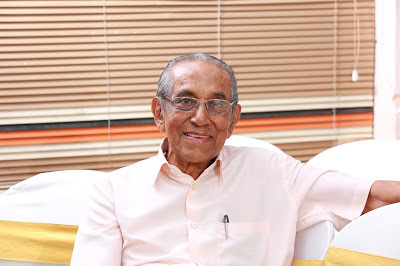
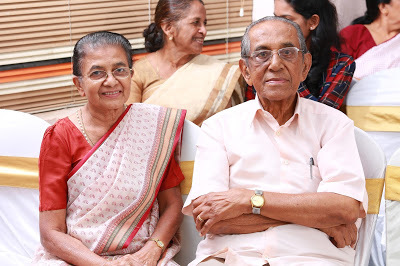
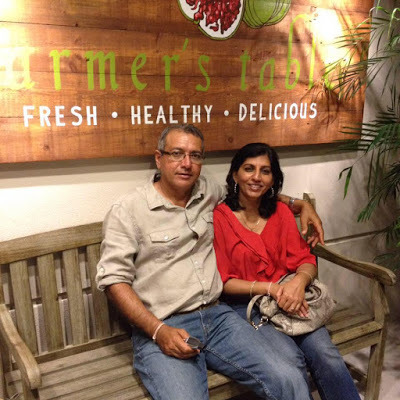 By Shevlin Sebastian
By Shevlin Sebastian Photos: Joseph Sebastian; parents Joseph and Ritty; Anup Singh Rashtrawar and wife Madhu
September 17 was a momentous day in my father’s life. He had turned 90. Amazingly, he still has black hair. There are two reasons for this: one is genetics and the other is castor oil. So, for those of you who want black hair at an advanced age, use castor oil for at least 40 years.
Meanwhile, like all parents, my father, Joseph, had a profound influence on me. Like him, I get up early, and make the bed, whenever possible.
In his spare time, my businessman-father had been an editor of a social-service magazine, in Kolkata. So, from my childhood, I have seen him edit matter and type his articles on the typewriter. I am doing both, although, instead of the typewriter, I use a laptop.
At age 90, he pays his own electricity, telephone, water, food, and newspaper bills. He has never depended on the government for pension or help. When I wanted to be a journalist, he never insisted that I should become a doctor or an engineer. As a result, I have spent the past 30 years doing a job I love.
But there is one aspect of my father which I have never absorbed: his passion to help the poor and the downtrodden. The few times I went into a slum, at Kolkata, where I grew up, (I live in Kochi now) it unnerved me. The atmosphere of defeat and despair coupled with the filth and the smell was too much for me to bear. I ran away. And never went back.
But, amazingly, my father had an impact on my neighbor and childhood friend, the tennis coach Anup Singh Rashtrawar. He wanted to do what my father was doing.
One day, at the Calcutta Gymkhana, Anup noticed a boy staring through the railings at the courts. So Anup called him in. A Muslim boy, Rashid (name changed) lived in a nearby slum. He told Anup he wanted to play tennis.
So, Anup taught him the basics, even as Rashid earned his keep as a ballboy. Soon, Rashid took part in competitions and began to do well. A few years later, he was able to secure a job through the sports quota of the railways.
Today, Rashid owns a flat and his children are studying in prestigious English-medium schools.
Eventually, Anup rescued more than 30 boys from the slum. And they are all doing well. Anup, himself, is doing well, as a coach in a millionaire’s club at Florida. And he has helped countless others over the years.
Here is another example. Last year, he saw an article in a national newspaper about a Muslim girl in the middle of Madhya Pradesh who wanted to go for medical studies but did not have the money. He called up the Delhi office of the newspaper and got the Bhopal number. From there he got the reporter’s contact and got in touch with the girl. Now, Anup is funding her medical education.
And, even today, whenever he calls me up he inquires about my father's well-being. The question that is asked of people, at the end of life, is this: with your actions, did you do good or harm? My father only did good. Thank you for being such a remarkable role model.
And happy birthday once again Daddy!
(A shorter version was published as a middle in The New Indian Express, South Indian editions)
Published on September 20, 2016 19:44
September 19, 2016
Capturing Life As It Happens
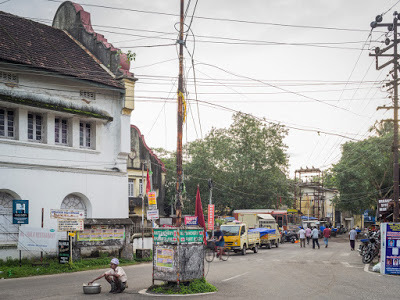
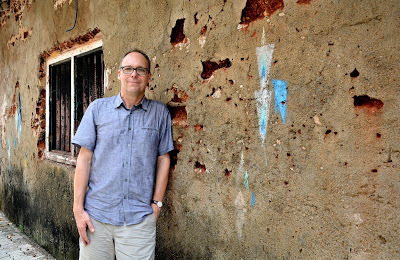 German photographer Peter Bialobrzeski spent one month in Kochi to shoot images for a photo-diary
German photographer Peter Bialobrzeski spent one month in Kochi to shoot images for a photo-diaryPhotos: Kochi street scene by Peter Bialobrzeski; Photo of Peter Bialobrzeski by Ratheesh Sundaram
By Shevlin Sebastian
German photographer Peter Bialobrzeski, 54, could not resist himself. When he saw the frenzy during the release of Tamil superstar Rajnikanth's 'Kabali' in end July, at Kochi, he went and saw it at a cineplex. “The cinematography and the settings were absolutely amazing,” he says. “The sound and music was almost like a Quentin Tarantino film. However, Rajnikanth's acting was exaggerated. In the West we are used to subtlety. Nevertheless, I enjoyed myself.”
Peter was in Kochi to shoot photos for his Kochi diaries. “These are images of Fort Kochi, Mattancherry, as well as the main town, but will be shown in the form of a diary,” he says. Peter had secured a one-month residency from the Goethe Institute in Bengaluru and was working in association with the Kochi Bienalle, as well as the Pepper House Residency.
He had published in diary form earlier: there are books on Cairo, Taipei, as well as his hometown of Wolfsburg. Another one, on Beirut, is in the works. These have been published by The Velvet Cell, which is run by the Osaka-based Irishman Eanna de Freine. “These are not touristy pictures,” he says. “So the books will appeal to only those who are interested in photography, as well as artistes.”
On most days, Peter would get up at 5.30 a.m., at Fort Kochi, and walk around and take photographs till 7 a.m. “I stopped when the sunlight became too strong,” he says. “I also strolled about in the evenings.” Most of his photographs are of capturing life as it happens: there are images of wandering cows and goats; a man loading goods onto the back of a lorry; a woman walking through a gap between buildings.
In one photo, taken at twilight, in Fort Kochi, at a crossroads, there is a lamp post in the middle, with a red Communist flag at one side. Amazingly, a man sits, a few inches away, almost in the middle of the road, with a large container, in which he kept fish. In the background, people are walking about. A foreigner, in a black T-shirt and blue shorts, is riding a cycle. Across the top of the frame are electric and cable wires criss-crossing each other, a typical aspect in most streets of India today.
“I am interested in the flow of things,” says Peter. “There is a lot of waiting to get the right photograph. Some figures are sharp but there is also movement in the photographs. I don’t want to take cute images.”
To get his realistic photos, Peter uses the Canon 5D Mark II, as well as the just-introduced Leica SL. “I have been asked by the manufacturer to give a review,” says this professor of photography at the University of the Arts in Bremen. As for the lens, Peter prefers the Zeiss shift 35 mm lens. Interestingly, out of the thousands of images that he has taken, he will short-list only 51 for the book.
Finally, when asked about the Indian photographer he admires the most, Peter says, “The late Raghubir Singh [1942-1999]. He was not much into the beauty of a place. Instead, his photos were abstract and edgy, and, therefore, authentic.”
(Sunday Magazine, The New Indian Express, South India and Delhi)
Published on September 19, 2016 18:58
September 14, 2016
The View From The Other Side
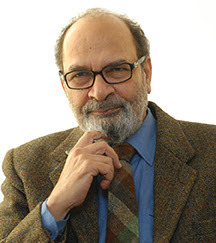 Noted journalist Saeed Naqvi talks about the trends in India today while on a recent visit to Kochi
Noted journalist Saeed Naqvi talks about the trends in India today while on a recent visit to Kochi By Shevlin Sebastian
In early July, noted journalist Saeed Naqvi had gone to his ancestral village of Mustafabad (80 kms from Lucknow). While there, he noticed that the people were crying. “One elderly woman told me that she had not eaten for two days, because of what she had seen on TV."
What the woman saw was a video of two Muslims – Rizwan and Mukhtar – who were forced to eat cowdung, and drink urine, in Haryana because they were suspected of transporting beef.
“The ordinary people don't like bad manners,” says Naqvi. “There is a certain sense of aesthetics in the country. These brigades of young men, who are doing this, are brittle. They are not part of the Hindu ethos.”
Naqvi had come to Kochi to give a reading as well as have a discussion about his non-fiction book, 'Being The Other – The Muslim in India'. (Publisher: Aleph; Price: Rs 599).
In the book, Naqvi dwelt on the personal as well as the social. So, he talks about his early life, growing up in Awadh, as a member of a distinguished family. He has also had a storied journalistic career, travelling to 110 countries, seeing first-hand, numerous wars, like the civil war in Sri Lanka and the US bombing in Libya as well as interviewing numerous national and international personalities.
However, today, Naqvi is worried about the way the 180 million Muslims have become 'The Other' in Indian society. “This is far more intense in the cow belt of North India,” he says. “Whereever there has been Muslim rule, communalism has grown. In places like Bengal, Kerala and Tamil Nadu, it is not that intense.”
And, in all this churning, a fight is going on for India's soul. “The battle is for the kind of Hinduism the people want,” says Naqvi. “The other is the caste battle. The top castes are worried that the lower castes are trying to topple the structure. So the top castes want to target the Muslim as 'The Other' and try for Hindu consolidation. On the other hand, the lower castes want to co-opt the Muslim and knock the structure down.”
In all these swirling currents in Indian society, Muslims, as well as members of other minority communities, are going through a state of high anxiety. “And so also are my secular Hindu friends,” says Naqvi. “The country has a silent majority which is tolerant.”
Meanwhile, when asked whether the numerous riots, which have convulsed India every now and then, will ever stop, Naqvi says, “It will only happen if we have a political leadership that thinks differently.”
Thereafter, he offers a quick suggestion. “If the population of Muslims is 14.2 per cent, why not allow 7 per cent to be part of the police?” says Naqvi. “If there is a riot in Muzaffarnagar (Uttar Pradesh), why cannot a mixed force be sent there?”
He also wants Muslims to change, too. “There should be an edict that will ensure that students, who go to madrasas, should attend regular schools,” he says, citing his own education at the prestigious La Martiniere school in Lucknow.
"I have another suggestion," he says. "Muslims should stay away from clerics and Hindus from communal politicians."
(Published in the New Indian Express, Kochi, Thiruvananthapuram and Kozhikode)
Published on September 14, 2016 20:57
September 12, 2016
Big Bikes And Bigger Hearts
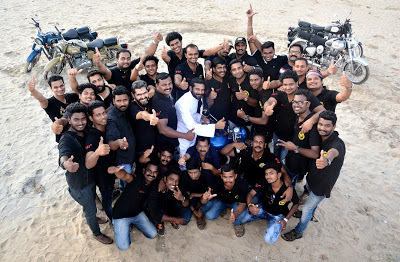 The members of the Alleppey Bullet Club indulge in their passion for riding, as well as helping people
The members of the Alleppey Bullet Club indulge in their passion for riding, as well as helping peoplePhoto by Ratheesh Sundaram
By Shevlin Sebastian
On a recent Sunday afternoon, a group of people appeared at the doorstep of Saneer Shereef, at Alleppey (53 kms from Kochi). It is a small maroon-coloured house, which has a verse from the Quran pasted just above the entrance.
Soon, a cash gift of Rs 13,600 was presented to Saneer's mother, Laila. She is suffering from an advanced stage of throat cancer and is undergoing several rounds of chemotherapy. Unfortunately, Saneer, who works as a labourer, is unable to meet the cost of the treatment.
When they stepped outside, one of the members, Vishnu Vijayan, said, “When we help people, of whatever religion they belong to, we get blessings from God.” The others nodded silently.
What is unusual is the group that gave the gift: they are the members of the Alleppey Bullet Club (ABC). “The club was formed in October, 2015,” says President K. Priyan, 44. “We began as a Facebook group and then decided to form the ABC.” All the members, numbering 160, are from the various towns of Alleppey district.
They consist of company employees, engineers, police officers, students, government employees, a Christian priest, Fr Benzi Sebastian Kandanat, as well as a Hindu priest, Santosh Kumar, and a couple of women.
Says medical student Neelima Oby, “Even if Keralites are very educated, they still make a face when they see a lady on a bike. So, the club is a good platform for those of us who want to live our dream of riding a Bullet.”
Asked the charms of a Bullet, as compared to other bikes, club secretary Rajeev Karthikeyan says, “You feel relaxed while riding a Bullet. The shock absorbers are great, so there is no strain on the lower back.”
And all of them find it easy to ride a Bullet even though, at 150 kgs, it is twice the weight of an average bike. “It does not matter how big or small you are,” says Rajeev. “You need to have confidence and mental strength. I have seen slim girls riding a Bullet without any problem. This is the most comfortable bike in India.”
Every now and then, the club members go for long rides, to different places in Kerala. “It is usually a round trip of 300 kms,” says Rajeev.
But, surprisingly, the biggest joy for them is to do charity works. “This idea to help others occurred because most of us are financially well-off,” says Priyan. “You need to be, if you are want to be able to afford a Bullet, which has a starting price of Rs 1.5 lakh.”
One day, they went to a government-run home and gave the physically challenged boys an irresistible offer: they could have any meal they have always dreamt of eating. So, for breakfast, the boys ate egg curry and appam (pancake made of fermented rice batter). For lunch they had biriyani, while for dinner, it was parathas and beef fry. “By seeing their joy, we felt a happiness that no ride has given us,” says Priyan.
On another occasion, while they were travelling, they saw a ramshackle house at a place called Mannancherry (8 kms from Alleppey). They went in and saw that it was the home of a mother and four children. The father had abandoned the family.
The children, one boy and three girls, aged from eight to 12, did not have the money to pay the school fees. The mother earned a bit of money through scavenging. So, the club collected money and bought text and exercise books, uniforms, tiffin boxes, shoes, raincoats and umbrellas. “We also gave a cheque of Rs 25,000,” says Rajeev. “Interestingly, the mother told us not to give money regularly. Otherwise, the family would get lazy.”
Finally, when asked about their future plans, treasurer Abhin Kumar says, “With the help of sponsors, we want to set up a refrigerator by the side of a busy road in Alleppey where people can store their excess food. At any time, a poor person can open it and take what they want.”
(Sunday Magazine, The New Indian Express, South India and Delhi)
Published on September 12, 2016 22:33
September 11, 2016
A Blossoming Talent

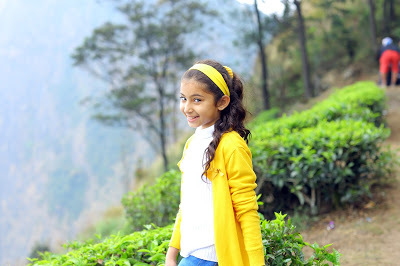 Child actor Sara Arjun makes a mark in the Mollywood film, 'Ann Maria Kalippilaanu'
Child actor Sara Arjun makes a mark in the Mollywood film, 'Ann Maria Kalippilaanu'By Shevlin Sebastian
Director Midhun Manuel Thomas felt tense. Child actor Sara Arjun had just returned, along with her mother Sanya, to the set of the Mollywood film, 'Ann Maria Kalippilaanu', at Thrissur after a visit to the doctor. “He had confirmed that Sara was in the early stages of chicken pox,” says Midhun. “But such was Sara's commitment that she took her tablets, put on make-up, and was ready for the scene, although I could see that she was weak and tired.”
The struggles were well worth it. 'Ann Maria Kalippilaanu' has received the thumbs-up from critics, as well as the audience, and is on its way to becoming a hit. And one of the primary reasons is Sara, who plays an 11-year-old girl to a doctor couple, Roy (Saiju Kurup) and Teresa (Leona Lishoy). But there is tension between husband and wife, because Roy is working in the war zone at Syria, while Teresa wants him back. Ann Maria, as an only child, also misses him.
But it is the acting of Sara that impresses the most. But Midhun was not surprised. “She has been acting in advertising films from the age of two,” he says. “Before Sara came to act in my film, she acted in 'Jazbaa' with Aishwarya Rai. I had seen her in the Tamil film, ‘Deiva Thirumagal’ (2011), and had been impressed. She is 11 years old, but has an experience of nine years. And that counts.”
At the same time, the Mumbai-based Sara was extremely well prepared. “There were 81 scenes with me,” she says. “At my home, I prepared for one month, with the help of a Malayalam teacher. I knew all the dialogues in every scene. I knew what was happening before my scene and after. I never felt that anything was tough, because I was well-prepared.”
Midhun says that Sara was adept at keeping emotional continuity from one scene to another. “It was amazing to see,” he says.
Despite her smartness, it is her father Raj Arjun, a Bollywood actor as well as a theatre artiste, who looks after Sara's career. For 'Ann Maria', Midhun first narrated the story on the phone to Raj. The latter liked what he heard. Then Midhun flew over, and gave the complete script to Raj. Then the latter got it translated into Hindi, read it, and finally gave his assent.
A happy Midhun says, “Sara has been trained to be a thorough professional. If she remains in the industry, she will become a fine actress one day.” Says a confident Sara, “I am looking for tough roles in which I can challenge myself.”
(Sunday Magazine, The New Indian Express, South India and Delhi)
Published on September 11, 2016 21:47
September 7, 2016
A Mixed Set Of Experiences
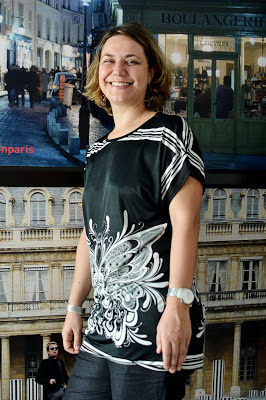
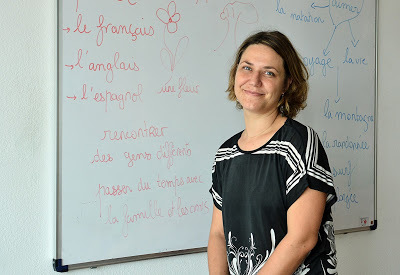 Alice Gauny talks about her time in Kerala, after a four-year-stint, as director of the Alliance Francaise in Thiruvananthapuram
Alice Gauny talks about her time in Kerala, after a four-year-stint, as director of the Alliance Francaise in Thiruvananthapuram Photos by Ratheesh Sundaram
By Shevlin Sebastian
When Alice Gauny would tell people that she is from France, many people would tell her about their own visit to Paris. “Then they will ask me how I am adjusting to life in Thiruvananthapuram,” says Alice, who has just returned to France after a four-year-stint as director of the Alliance Francaise.
“They will also ask me if I came with my family. When I say I am not married, they look surprised," she says. "It is not common for a Malayali woman to remain unmarried. That's because Kerala is a traditional society, with a deep and meaningful culture. So I learned to adjust to it, in my own way.”
She also had to adjust to the lack of privacy. “People want to know everything about your life,” she says. “But they mean no harm. This is their way of showing friendliness. In France, we are individualistic. We protect our privacy. When Europeans meet, they will not ask personal questions. It takes a while before we do this.”
She also had to adjust to the Malayali and the Indian reluctance to say no directly. “When I ask them to do something, the immediate response is ‘yes, yes’,” says Alice. “But in the end, it is a no. Again, this happens because they are so keen to help, but are afraid to hurt you.”
Nevertheless, Alice enjoyed her stint at Thiruvananthapuram. “The city is green and calm,” she says. “The Kovalam beach is nearby. It is very peaceful. I had offered a position to a French girl, at our Kochi centre, but she was happy to stay on at Thiruvananthapuram.”
In fact, Alice did notice a distinctive difference between Thiruvananthapuram and Kochi. “There is a lot of energy in Kochi,” says Alice. “The people have more drive and ambition. On the cultural front, Kochi is more dynamic.”
As for the similarities between Malayalis and the French, Alice says, “Like in France, in Kerala, people are very oriented towards politics. They have an opinion and want to express it. And both peoples go on strike often. Many Malayalis have been inspired by great French writers like Victor Hugo and Honore de Balzac. So there is a connection on the intellectual plane.”
And Alice, too, has a connection. When she goes to France and stays there for a few days, she suddenly realizes that she is missing India. “That is because India is full of life,” she says. “It appeals to the senses. There are many harsh things, but, at the same time, there are so many beautiful things, like music and culture. There is a potent energy in the country. It is a place where anything and everything is possible.”
She fears that Europe has become static. “France and Europe are looking too much towards the past,” says Alice. “The people are afraid of change and globalisation. There is a lack of confidence.”
Meanwhile, whenever she got a chance Alice travelled to other parts of India. So she went trekking in the Himalayas, enjoyed visiting the North-Eastern states of Sikkim and Assam, and spent time in Punjab, Gujarat Rajasthan, Goa, and Pondicherry.
As Alice looks back on her time in India, while enjoying a break in Paris, she is looking forward to coming to India again. “At this moment, I have not yet decided on my future course of action,” she says. “But India will always remain in my heart.”
(The New Indian Express, Kochi and Thiruvananthapuram)
Published on September 07, 2016 22:35



